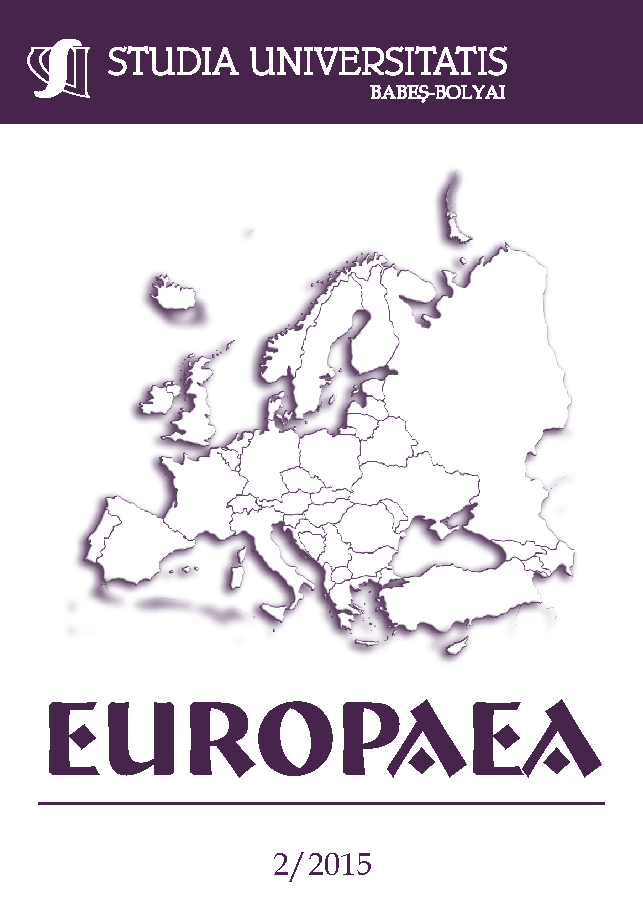VALUES AND IDENTITY IN EUROPE. OF GREENGROCERS, PILGRIMS AND WAR / WERTE UND IDENTITÄT IN EUROPA. VON GEMÜSEHÄNDLERN, PILGERN UND KRIEG
Keywords:
European Integration, Values, Identity, Civil Society, Religion, SecurityAbstract
The debate on values and identity in Europe cannot be avoided for purely functional or economic arrangements. The debate about democracy beyond the nation state and in the context of globalization is seen as a key to the debate of values and identities in Europe. From a processual perspective of democratization, the articles discusses some aspects of these debates on the level of civil society (“greengrocer”), religion (“pilgrim”) and security issues (“war”).
References
Anderson, Christopher J. et al. (2005), Losers' consent: elections and democratic legitimacy, Oxford: Oxford University Press.
Außenpolitik weiter denken, [http://www.aussenpolitik-weiter-denken.de/de/themen.html], 27. Mai 2015.
Barbato, Mariano (2012), "Europawissenschaftliche Erkundungsgänge im christlichen Europa. Das Leitbild der Pilgerschaft und Joseph Weilers Ansatz zwischen Religion, Recht und Politik" in Studia Europaea, Nr. 4, 97-118.
Barbato, Mariano (2014), “What kind of person is the state? The pilgrim as a processual metaphor beyond the Leviathan”, in Journal of International Relations and Development, online first: (14 November 2014). DOI: 10.1057/jird.2014.25), http://www.palgrave-journals.com/jird/journal/vaop/ncurrent/abs/jird201425a.html.
Barbato, Mariano (2012/2013), Pilgrimage, Politics, and International Relations. Religious Semantics for World Politics, New York: Palgrave.
Barbato, Mariano (2012), "Postsecular revolution: religion after the end of history" in Review of International Studies, Nr. 5, S. 1079-1097.
Brummer, Arnd (Hrsg.) (2009), Vom Gebet zur Demo: 1989 – die friedliche Revolution begann in den Kirchen, Frankfurt am Main: Hansisches Dr.- und Verl.-Haus.
Cronin, Audrey Kurth (2015), “ISIS Is Not a Terrorist Group” in Foreign Affairs Nr. 2, S. 87-98.
Crouch, Colin (2008), Postdemokratie, Frankfurt a. Main: Suhrkamp.
Führer, Christian (2008), Und wir sind dabei gewesen. Die Revolution, die aus der Kirche kam, Berlin: Ullstein.
Fukuyama, Francis (1992), Das Ende der Geschichte: wo stehen wir?, München: Kindler.
Geis, Anna; Müller, Harald; Wagner, Wolfgang (Hrsg.) (2007), Schattenseiten des Demokratischen Friedens. Zur Kritik einer Theorie liberaler Außen- und Sicherheitspolitik, Frankfurt a. M.: Campus.
German, Christiano (1999), Politik und Kirche in Lateinamerika. Zur Rolle der Bischofskonferenzen im Demokratisierungsprozess Brasiliens und Chiles, Frankfurt am Main: Vervuert.
Havel, Vaclav u. a. (2012/zuerst 1985), The Power of the Powerless. Citizens against the state in Central-Eastern Europe, London: Hutchinson.
Huntington, Samuel P. (1993), The third wave: Democratization in the late twentieth century, University of Oklahoma Press.
Neyer, Jürgen (2011) „Wider die Vereinigten Staaten von Europa. Europas demokratische Rechtfertigung“ in: Leviathan, 39, Nr. 4, S. 479–498.
Preuße, Detlev (2014), Umbruch von unten. Die Selbstbefreiung Mittel- und Osteuropas und das Ende der Sowjetunion, Wiesbaden: Springer Fachmedien.
Raabe, Katharina; Sapper Manfred (Hrsg.) (2015), Testfall Ukraine. Europa und seine Werte, Berlin: Suhrkamp 2015.
Rothholz, Walter (1997), „Rudimente einer Theorie der Säkularisierung im Islam“ in Zeitschrift für Religions-und Geistesgeschichte, 49 Nr. 3, 231-257.
Tilly, Charles (1992), Coercion, Capital, and European states, AD 990-1992, Oxford: Blackwell.
Veen, Hans-Joachim; März, Pete; Schlichting, Franz-Josef (Hrsg.) (2009), Kirche und Revolution. Das Christentum in Ostmitteleuropa vor und nach 1989, Köln/Weimar: Böhlau.
Winkler, Heinrich August (2015), Geschichte des Westens. Die Zeit der Gegenwart, München: Beck.
Downloads
Published
How to Cite
Issue
Section
License
Copyright (c) 2015 Studia Universitatis Babeș-Bolyai Europaea

This work is licensed under a Creative Commons Attribution-NonCommercial-NoDerivatives 4.0 International License.






